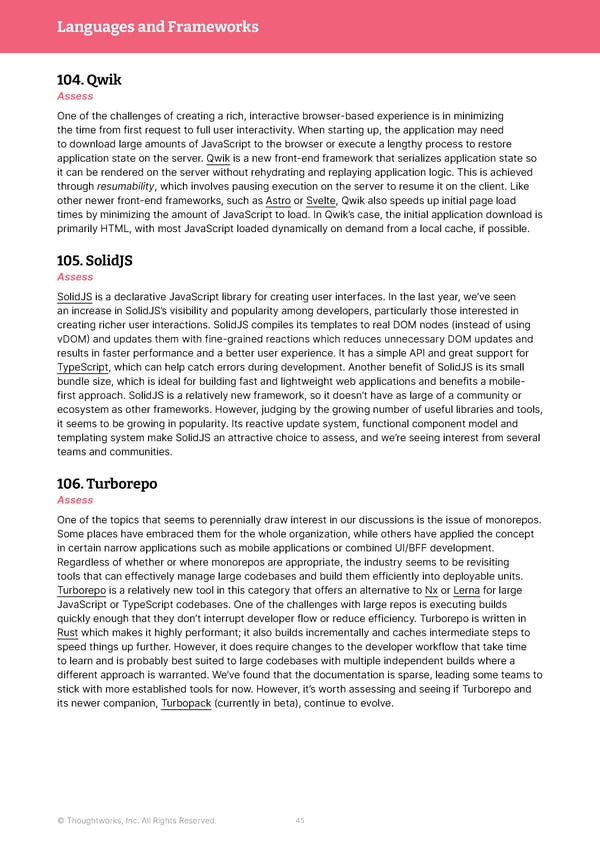Languages and Frameworks 104. Qwik Assess One of the challenges of creating a rich, interactive browser-based experience is in minimizing the time from first request to full user interactivity. When starting up, the application may need to download large amounts of JavaScript to the browser or execute a lengthy process to restore application state on the server. Qwik is a new front-end framework that serializes application state so it can be rendered on the server without rehydrating and replaying application logic. This is achieved through resumability, which involves pausing execution on the server to resume it on the client. Like other newer front-end frameworks, such as Astro or Svelte, Qwik also speeds up initial page load times by minimizing the amount of JavaScript to load. In Qwik’s case, the initial application download is primarily HTML, with most JavaScript loaded dynamically on demand from a local cache, if possible. 105. SolidJS Assess SolidJS is a declarative JavaScript library for creating user interfaces. In the last year, we’ve seen an increase in SolidJS’s visibility and popularity among developers, particularly those interested in creating richer user interactions. SolidJS compiles its templates to real DOM nodes (instead of using vDOM) and updates them with fine-grained reactions which reduces unnecessary DOM updates and results in faster performance and a better user experience. It has a simple API and great support for TypeScript, which can help catch errors during development. Another benefit of SolidJS is its small bundle size, which is ideal for building fast and lightweight web applications and benefits a mobile- first approach. SolidJS is a relatively new framework, so it doesn’t have as large of a community or ecosystem as other frameworks. However, judging by the growing number of useful libraries and tools, it seems to be growing in popularity. Its reactive update system, functional component model and templating system make SolidJS an attractive choice to assess, and we’re seeing interest from several teams and communities. 106. Turborepo Assess One of the topics that seems to perennially draw interest in our discussions is the issue of monorepos. Some places have embraced them for the whole organization, while others have applied the concept in certain narrow applications such as mobile applications or combined UI/BFF development. Regardless of whether or where monorepos are appropriate, the industry seems to be revisiting tools that can effectively manage large codebases and build them efficiently into deployable units. Turborepo is a relatively new tool in this category that offers an alternative to Nx or Lerna for large JavaScript or TypeScript codebases. One of the challenges with large repos is executing builds quickly enough that they don’t interrupt developer flow or reduce efficiency. Turborepo is written in Rust which makes it highly performant; it also builds incrementally and caches intermediate steps to speed things up further. However, it does require changes to the developer workflow that take time to learn and is probably best suited to large codebases with multiple independent builds where a different approach is warranted. We’ve found that the documentation is sparse, leading some teams to stick with more established tools for now. However, it’s worth assessing and seeing if Turborepo and its newer companion, Turbopack (currently in beta), continue to evolve. © Thoughtworks, Inc. All Rights Reserved. 45
 Immersive Experience — Vol 28 | Thoughtworks Technology Radar Page 44 Page 46
Immersive Experience — Vol 28 | Thoughtworks Technology Radar Page 44 Page 46